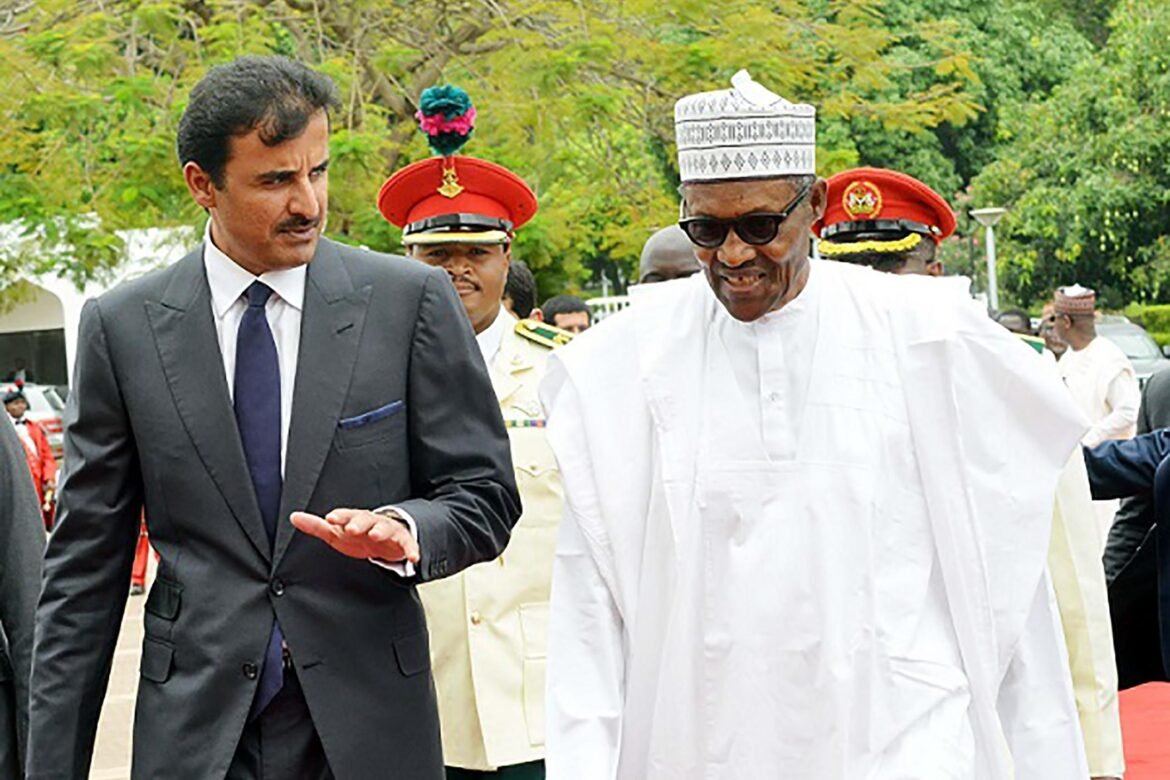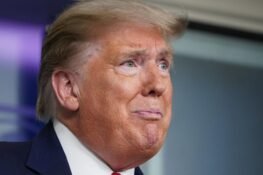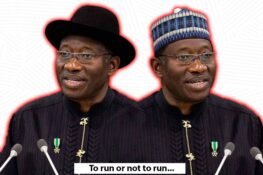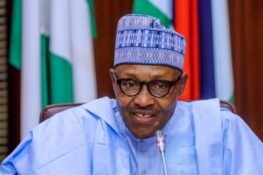President Muhammadu Buhari on April 23, 2019 played host to the Emir of Qatar, Sheikh Tamim Bin Hamad Althani.
He was in Nigeria on an official visit. The visit lacked fanfare, elaborate ceremonies and was of very short duration.
But it was as far from insignificant. Apart from his relationship with German Chancellor, Angela Merkal, which is almost impossible to quantify, Buhari may be looking at his biggest foreign policy success with the visit of the Qatari Emir.
And the reason is simple: money. On the other hand, it also has the potential to cause the president trouble. China has poured billions of dollars into Nigeria in loans and project financing.
But the invested billions have been the result of a deliberate policy by the Chinese government. This is relatively uniform across Africa rather than the results from efforts of the Buhari government.
Qatar is a country of 2.6 million people, just a little bigger than Kwara, which is the seventh least populated state in Nigeria.
Yet, Qatar has a GDP of $184bn, roughly half the size of Nigeria’s. But in terms of per capita income, Qatar is the richest country in the world.
Spelling out what was discussed during the meeting of the two leaders, presidential spokesman Femi Adesina quoted Buhari as asking the Emir to invest in several sectors of the Nigerian economy including oil and gas, agriculture, aviation, railways, power and of course, the project that is dearest to the president’s heart – recharging the Lake Chad
And when it comes to its Sovereign Wealth Fund, the Qatar Investment Authority is worth at least $115bn and receives an average of $30bn from the state each year.
QIA has a local arm, National Wealth Fund and a foreign investment arm, Qatar Holding, which is reported to have $100bn in assets.
And President Buhari wasted no time in piling all of the country’s financial troubles on the lap of Sheikh Tamim.
Spelling out what was discussed during the meeting of the two leaders, presidential spokesman Femi Adesina quoted Buhari as asking the Emir to invest in several sectors of the Nigerian economy including oil and gas, agriculture, aviation, railways, power and of course, the project that is dearest to the president’s heart – recharging the Lake Chad.
It is the president’s firm belief that recharging the Lake will provide a means of livelihood for 30 million people across West and Central Africa and maybe even solve the problem of insecurity and restlessness in Northeast Nigeria.
It all read like a presidential wish list. And on whether any commitment was made by the Qatari leader, Adesina did not say. But apart from the rewards he is expected to reap from investing in Nigeria, the pertinent question is what Buhari can give back in return.
There is no doubt the oil rich sheikh and Emir of Qatar did not come all the way to Nigeria only to talk about investing money.
On a normal day, the best investment opportunities on the planet will come knocking at his door. There is the fact, too, that the visit was no accident.
Qatar is not a country at war. But it is not exactly at peace either. Since June 2017, the country has had to endure an economic and diplomatic blockade imposed by its neighbours, Saudi Arabia, United Arab Emirates, Bahrain and Egypt.
In a way, the dispute was caused by the success of its foreign policy and reshaping the middle east in the way it wants to see it.
Qatar supported the Arab Spring, the wave of popular uprisings that toppled governments in Egypt, Tunisia and Algeria, which started in late 2010.
And even though Qatar itself is a monarchy, it’s support for people taking to the streets against their governments did not go down well with the Monarchs in Saudi Arabia and the UAE.
In response, both the Crown Princes in UAE and in Saudi Arabia formed a tag team to not only cage Qatar, they have also been moving to play catch up and implement a more assertive foreign policy.
Though Qatar itself is a monarchy, its support for people taking to the streets against their governments did not go down well with the Monarchs in Saudi Arabia and the UAE
This has seen some level of success but has also put them at odds with other countries in the region, particularly Iran. And the main flash point has been the war in Yemen.
Forty five per cent of the population of Saudi Arabia is below the age of 25. That’s a demographic change that has slowly been building up since the turn of the century.
Yet, for the last three decades, the kingdom has been ruled by aging monarchs and princes with great grandchildren. That ruling structure seemed set to remain when a 79-year-old Salman Bin Abdelaziz was crowned king in January 2015.
But what emerged was a radical break from the past. His then 29-year-old son, Mohammed Bin Salman, turned to be not only the man behind the throne but is genuinely thought to hold the reins of power.
Since his emergence, first as deputy crown prince and later, crown of the kingdom, Mohammed Bin Salman has embarked on what would normally be earth shaking reforms.
He has loosened social restrictions that has made him the darling of young people in the kingdom, western governments and the international media. These changes have won him praise from many quarters.
All of that changed when news broke of the murder of Saudi journalist, Jamel Khashoggi on October 2, 2018 at the hands of Saudi government agents at the Kingdom’s consulate in Istanbul, Turkey.
While the Turkish government, United States’ intelligence and even the media have alleged links between the Saudi agents that carried out the murder and Crown Prince Bin Salman, the Saudi government has described those responsible as rogue agents and has gone as far as putting them on trial.
Turkey shares a similar outlook with Qatar on regional issues and has used the Khashoggi incident to drive a wedge between the Saudi’s and the rest of the world.
The recent release of Zainab Aliyu, a young Nigerian accused of drug trafficking and imprisoned in Saudi Arabia is an expression of the bridges the Buhari government has built in the kingdom
Meanwhile, the prince himself has slowly been trying to rebuild his image. He has offerred millions of dollars in blood money to the Khashoggi famil.
He has also reached out to European nations considering sanctions, particularly on the sales of arms and sophisticated weapons. A stumbling block however has been the war in Yemen.
For years, Amnesty International has raised concerns about human rights in Saudi Arabia. Those concerns have today been aggravated by the four year old war Yemen with its accompanying humanitarian crisis.
The war has left thousands dead including women and children. One person that has stood by the Saudi government throughout the times it has been under international pressure and public scrutiny has been the US President Donald Trump.
The president has never hidden his reasons: the Saudi’s are big spenders in America’s defense industry and investors in other key sectors. Beyond that, they hold foreign reserves in U S dollars amounting to $500bn.
The bad publicity in the international media has also not gotten in Buhari’s way in trying to draw closer to the ruling princes in the kingdom and those of the UAE.
In fact, the Nigerian president has been just as successful in building relationships with the princes in UAE, Crown Prince Mohammed Bin Zayad Al Nahyan and Prime Minister, Prince Mohammed Bin Rachid Al Maktoum.
With the signing of several treaties relating to criminal matters, the UAE has been central to Buhari’s anti-corruption war.
It has led to the seizures of several properties in the UAE that are reportedly owned by Nigerians and are suspected of being bought with money that were the proceeds of crime.
what does the Qatari Emir want? Could he simply be looking for friends in an increasingly cold world?
In a way too, the recent release of Zainab Aliyu, a young Nigerian accused of drug trafficking and imprisoned in Saudi Arabia is an expression of the bridges the Buhari government has built in the kingdom.
It’s a country that is usually stone deaf to pleas from the outside when foreign nationals breach their laws.
But none of the relationships, with all of the three Mohammed in UAE and Saudi has translated to Foreign Direct Investment in the Nigerian economy.
What they have brought instead is Sheikh Tamim Bin Hamad Althani. Every country in the gulf region has either picked sides in the dispute between Qatar and its neighbours or is staying out of it.
So what does the Qatari Emir want? Could he simply be looking for friends in an increasingly cold world?
How well versed is Buhari in international diplomacy, especially the murky waters of Middle East politics to serve as an effective mediator?
Maybe the most he can achieve is to put in a word or two which could go a long way especially when no one else is mediating.
On the same day the Emir was in Aso Rock, Nigeria’s minister of state for petroleum resources, Ibe Kachikwu, was in Saudi Arabia holding talks with the country’s energy minister, Khalid Al Falih and the Chief Executive of Saudi Aramco, Amin Nasser. Saudi Aramco, is probably the biggest company in the world, whether in cash, assets or investments.
Kachikwu would later explain that an MoU is in the works for Saudi Arabia to build a refinery in Nigeria, invest in the existing ones and also invest in liquefied gas.
So if Buhari can keep all the monarchs happy, his shuttles to the Arabian peninsula might just bear fruits on several fronts.








